2. Fictive Detective Material
The usual work, then, of a real detective does not demand the extraordinary powers of the fiction detective. But the plots selected by fiction writers for their stories are the cases that do demand it. And this, because it interests the reader's imagination, piques his curiosity and makes possible the solution of the problem.
The assertion of Sherlock Holmes founded on the aphorism that truth is stranger than fiction is in itself fiction.
"My dear fellow," said Sherlock Holmes, as we sat on either side of the fire in his lodgings at Baker Street, "life is infinitely stranger than anything which the mind of man can invent. We would not dare to conceive the things which are really mere commonplaces of existence. If we could fly out of that window hand in hand, hover over this great city, gently remove the roofs, and peep in at the queer things which are going on, the strange coincidences, the plannings, the cross-purposes, the wonderful chains of events, working through generations, and leading to the most outré results, it would make all fiction, with its conventionalities and foreseen conclusions, most stale and unprofitable."
"And yet I am not convinced of it," I answered. "The cases which come to light in the papers are, as a rule, bald enough, and vulgar enough. We have in our police reports realism pushed to its extreme limits, and yet the result is, it must be confessed, neither fascinating nor artistic."
"A certain selection and discretion must be used in producing a realistic effect," remarked Holmes. "This is wanting in the police report, where more stress is laid perhaps upon the platitudes of the magistrate than upon the details, which to an observer contain the vital essence of the whole matter."
The first-quoted remarks of Holmes are pure fiction and are introduced by the author to give an effect which he desires. But it is the truth that a certain selection and discretion must be used regarding plots, and it is this that makes or mars the interest of the Detective Story.
Poe's three masterpieces of detective fiction are perfectly conceived, constructed and completed, entirely in his imagination. But when he undertook "The Mystery of Marie Rôget" he worked upon a plot founded on fact; the story of a real murder of a real girl, with the result that there was no dénouement, and the editors of the magazine in which the story originally appeared, decided that it would be best to omit the latter half of the tale, and we are told that it was never printed in full. Though interesting in its statement of the problem, the solution never could be reached, and the story, as a Detective Story, was a failure.
3. The Transcendent Detective
The status of the fiction detective is so well-defined that it is the habit of authors to scoff at it, and endeavor to convince us that their own detectives are true to life.
For instance, in a Detective Story of some merit, called "The House Opposite," by Elizabeth Kent, the detective says:
"I am aware that the detective of fiction is always supposed to be omniscient, but my profession, Doctor, is just like any other. There is no hocus-pocus about it. To succeed in it requires, in the first place, accurate and most minute powers of observation, unlimited patience, the capacity of putting two and two together. Add to this an unprejudiced mind, and last, but not least, respect, amounting to reverence, for any established fact."
Many authors of late think it argues themselves original to indulge in a fleer at the methods of Sherlock Holmes. A typical example of this often-used device is here quoted from "Midnight at Mears House," by Harrison J. Holt:
As I smoked, my gaze travelled idly about the room till it rested upon the big brass candlestick smeared with melted tallow which we had found that morning on the dining table.
"If I were only another Sherlock Holmes now," I thought, "I should be able to reconstruct the entire tragedy from that candlestick, supposing of course the murderer used it. An intelligent smell of the wick would tell me what particular brand of matches he used to light it, and it would only be necessary to visit the one dealer who kept them and get from him a photograph of the man, or a sufficiently accurate description of him, to make his arrest a matter of only a trifling difficulty." I chuckled at the absurdity of the notion. It seemed however, hardly more far-fetched and ridiculous than some of the great detective's marvellous exploits, which millions of readers have found plausible enough, I daresay, though I was never one of them.
Yielding to a sudden whim, I took down the candlestick from the mantelpiece.
"I should at least be able to deduce a few simple facts from a really scientific examination of it," I argued, facetiously—"whether the criminal was right or left-handed, for instance, or wore ready-made clothes, or if he was suffering from rheumatism or the whooping cough. It must be all here somewhere."
I proceeded gravely to smell of the wick. It had a decidedly burnt odour, due very likely, I imagined, to its having been lighted. It humiliated me, however, to be unable to decide how it had been lighted. I could not for the life of me make out whether the murderer had used wax vesta, safety-matches, ordinary parlour matches, or those infernal things tipped with sulphur commonly known as "hell-sticks."
He might even have lighted it with one of those self-igniting platinum-wire and alcohol devices, or with flint and steel, or by rubbing two sticks together, for all I could tell.
I began to feel discouraged. Doubtless there were imprints of his fingers as thick as flies and as plain as billboards all over the candlestick itself, if I could only find them. He would at any rate have left the damning mark of his thumb somewhere upon its shining surface: they were always considerate enough to do that—in the detective stories. It was part of the game. But again I was doomed to disappointment. We must have blurred the impressions through our inconceivable stupidity in touching the thing at all. We should have known enough, I reflected, to have left it alone till we had a chance to study it through a high-powered telescope.
This is good-natured satire, and the very fact that it contains the kernel of truth makes it effective.
4. Pioneer Detectives of Fiction
Though lacking the title, the Transcendent Detective doubtless makes his earliest appearance in the person of M. Dupin.
The first allusion to Dupin's peculiar talents is found in "The Murders in the Rue Morgue":
"At such times I could not help remarking and admiring (although from his rich ideality I had been prepared to expect it) a peculiar analytic ability in Dupin. He seemed, too, to take an eager delight in its exercise—if not exactly in its display—and did not hesitate to confess the pleasure thus derived. He boasted to me, with a low chuckling laugh, that most men, in respect to himself, wore windows in their bosoms, and was wont to follow up such assertions by direct and very startling proofs of his intimate knowledge of my own. His manners at these moments were frigid and abstract; his eyes were vacant in expression; while his voice, usually a rich tenor, rose into a treble which would have sounded petulantly but for the deliberateness and entire distinctness of the enunciation. Observing him in these moods, I often dwelt meditatively upon the old philosophy of the Bi-Part Soul, and amused myself with the fancy of a double Dupin—the creative and the resolvent.
"Let it not be supposed, from what I have just said, that I am detailing any mystery, or penning any romance. What I have described in the Frenchman was merely the result of an excited, or perhaps of a diseased, intelligence."
Читать дальше












